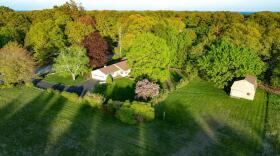Housing is the biggest concern for Granite Staters, according to the most recent Granite State Poll from the University of New Hampshire. Researchers asked over 1,300 people about the biggest problem facing New Hampshire, and nearly a third said housing – followed by taxes and education.

The poll comes out a little more than a week after Gov. Kelly Ayotte announced her budget proposal for the next two years.
“There is no greater pressure weighing on the economic success of our state right now, than our housing market and the challenges we're facing there,” she said during her budget address. “Supply is tight, demand is high, and inventory is expensive. Our economic success hinges on our ability to attract talent here.”
The median price of a home in New Hampshire is around half a million dollars, and median rent for a two-bedroom apartment was $1,833 in 2024, according to New Hampshire Housing.
The Granite State Poll shows about half of Granite staters approve of Ayotte, about a quarter of which cite the way she's handling the state's finances.
Ayotte’s proposed $16.5 billion state budget would cut spending funded by state tax dollars by $150 million or roughly 3%, a reduction Ayotte claimed was undertaken “with a scalpel, not a shovel.”
One of the areas impacted by this reduction is housing, although Policy Analyst Jessica Williams of the New Hampshire Fiscal Policy Institute said it was difficult to compare budgets over two-year periods.
She said that $50.25 million in state funds are dedicated to housing investments in the current State Budget. Of that, $10 million in the current budget are allocated to homelessness and housing shelter programs – including $8 million in increased rates paid to shelters and $2 million for other shelter services.
“The Governor has proposed maintaining these increased rates, while other housing investments in the current Budget do not appear to be repeated,” Williams said in an email.

Williams also noted that the budget for homelessness is increasing as the governor proposed an additional $10 million over two years for homelessness services through the Department of Health and Human Services to aid those with substance use disorders using available opioid abatement funds.
Research Director Phil Sletten also noted that the current budget has one-time housing investments of $40.25 million funded with surplus state general fund dollars leftover from state fiscal year 2023. He added that Ayotte did not repeat these one-time contributions in her state budget proposal, based on information currently available.
In a policy brief, the New Hampshire Fiscal Policy Institute has also noted that zoning or land use laws that restrict the building of housing units, as well as increased labor and construction costs, may all contribute to the shortage of housing in the state.
During her budget address, Ayotte also announced a plan to streamline the permitting process to 60 days. If a building permit takes longer than 60 days to review, the permit will be granted automatically.








